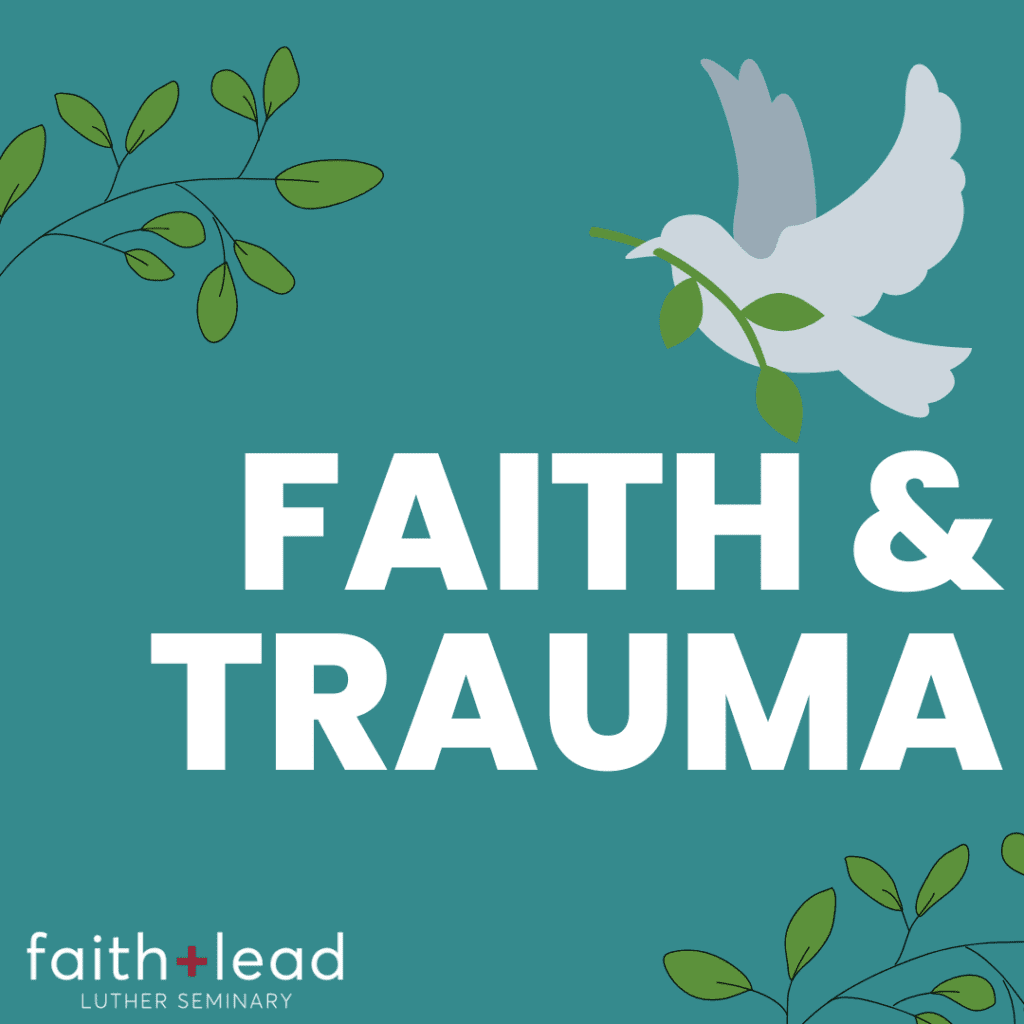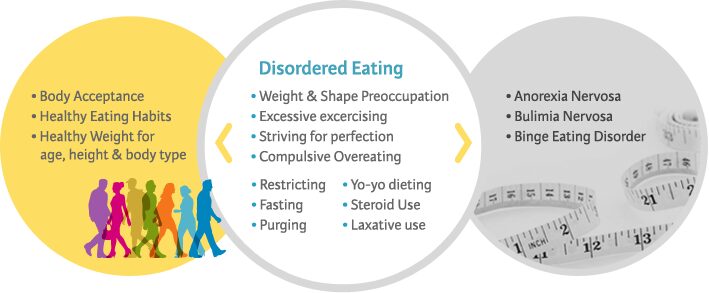Like many people with disordered eating, the pandemic and isolation broke down my last bits of defense. My income was halved, my relationship ended, my anxiety became unmanageable, and I began to look for something I could control. That thing was food, except I couldn’t control it. I looked up a treatment center to see if they even treated this made-up-sounding disorder I was told I had. They did. I got an assessment, thinking there was no way I would qualify. I did. I finally accepted I might really be sick.
A lot of good came from treatment—not only did I recover, but it was the catalyst for me to change careers and start seminary sooner. I am incredibly grateful for the help I received and that I was finally humble enough to accept it. I am also acutely aware that either for lack of information, access, or support, many don’t have that opportunity.
Knowing how to help someone with an eating disorder is difficult. Embracing the Image of God in ourselves and others is the best place to start.
Children are listening (and so are your friends)
During the most recent Girl Scout cookie season, I saw a meme that said, “Kindly take your Girl Scout cookies and enjoy them without commenting about how they’re going to ruin your diet. Those Girl Scouts selling them can hear you!”
While this reinforces the misconception that only girls and women have eating disorders, it also reminds us that children do listen and pick up on what the adults around them value. I was 3 the first time I remember a family member saying something disparaging about their body; how old were you?
Our beliefs and relationships with our bodies, food, and movement begin to be forged in subtle ways in early childhood. When we hear those we look up to say they will need to work out extra if they eat that cupcake or telling us to drink or eat something specific so we will be strong and tall or not get fat, we learn that some foods are good and others bad. Strong and tall are good (but not too strong or tall if you’re a girl) and fat is bad. Bodies that don’t perfectly meet the blurry and moving target of these value-defining criteria are lesser and something to be changed—some parts made smaller and others bigger, taller, broader, more compact, bulkier, curvier, flatter, or altered in some other way to be made acceptable.
As adults, we continue to tell these body stories to ourselves. We tell ourselves it’s about health when research shows that weight is not an independent indicator of health and longevity. Do you know what are independent predictive factors of either good or poor health? Health-promoting behaviors include regular movement, socializing, spiritual practices, and balanced nutrition, but weight stigma is another factor. That’s right—having a negative view of one’s weight indicates negative health outcomes in a way that weight and BMI do not. We need to tell a better story.
Our faith tells a better story
In the creation accounts of Genesis 1 and 2, we see our creator lovingly mold humanity from dust into the very image of the divine, making them image-bearers entrusted with the care of creation they are a part of. In stark contrast with our modern understanding of image as something, often false, that people curate and project to protect themselves either from the judgment of others or their own harsh inner critic, the Imago Dei is not merely a projection or likeness. It represents God in such a way that carries with it the connotation that how we treat the image is a direct reflection of our treatment of God. That not only means how we treat others is a reflection of our treatment of God, but how we treat ourselves is as well. For the cherry on top (I will not apologize for a good food pun), after making humanity in the Divine image, God calls us good. We were created good.
We know what happens in the next chapter—in Genesis 3, sin enters the world, and everything falls apart. Except not all. While the Fall did result in a lot of horrible things (violence, patriarchy, oppression, diet culture…), the image of God cannot be destroyed—it can only be concealed and distorted. We are still good.
So many though, and especially people struggling with eating disorders, feel uniquely broken and describe the intense shame and an inner void. Sometimes so much crap is piled on top of the Imago Dei that it gets hard to see. The Good News of Jesus Christ promises that we will continuously be made good, re-created and renewed, day by day, by the very God that created us good in the first place.
It’s okay to have Jesus and a therapist too
Any good therapist will tell you that the issue is rarely the issue. Many people with eating disorders have significant trauma in their history, although it is often unacknowledged. Food insecurity, abuse, neglect, poverty, and mental health disorders are all risk factors for developing an eating disorder (dieting being another risk factor). Many people with eating disorders report feeling as if they have no control over their lives and find that the behaviors of their disorder give them a sense of control. While the disordered behaviors must be treated first, if the underlying causes are not addressed, recovery will not take. Simply stopping binging, purging, restricting, etc. is not the same as recovering.
Recovery is very hard work—it is time-consuming, frustrating, paradigm-shifting, exhausting, and does not proceed in a linear, organized fashion. A few hours of treatment can feel like a 12-hour day of work, and the person recovering may not have a lot left to give. It’s sometimes helpful for friends and family to make a plan to help shoulder some of their loved one’s responsibilities in order to allow them to focus on their recovery.
A word of caution: You aren’t a therapist or health professional specializing in the treatment of eating disorders (unless you are, in which case you have extensive training in boundaries). People go to school for a very long time and spend years gaining experience to specialize in this field. Love people and affirm their goodness. Tell them how much God loves them. Sit with them while they cry as they struggle to eat. But don’t give nutritional advice or try to fix it. Take care not to lecture or use guilt to persuade. What you can do is help them to connect with recovery resources, so that they can be empowered to take the steps toward recovery when they are ready.
Look in the mirror
Look in the mirror—metaphorically, not literally (most of us do that enough). We all want to love others well, but diet culture is so ubiquitous and unavoidable in the US, that many Americans exhibit one or more patterns of disordered eating. Calorie and macro counting, avoiding certain nutrients (think carbs or fat), only eating “clean” foods, avoiding eating at certain times of day, or restricting or exercising to “make up for” an indulgence are all considered disordered eating. Be willing to honestly assess your own participation in diet culture and disordered eating behaviors.
Be critical of the beliefs that lead you to those choices and consider whether you want to continue them. Honoring the image of God in ourselves is the first step to helping others recognize it in themselves.
Help de-bunk misperceptions about eating disorders – with facts
- Not all people with eating disorders are women—eating disorders affect every gender, class, ethnicity, and sexual orientation.
- People of all body types can have eating disorders (including Anorexia.
- Binge Eating Disorder is the most common eating disorder in the US and the most likely to affect men.
- Though a higher percentage of gay and bisexual men have eating disorders, most men with eating disorders are heterosexual.
- There hasn’t been enough research done to quantify eating disorders among transgender and non-binary people, but there is enough to know that they also can have them, and suggest they are at higher risk of developing one.
- People of color experience eating disorders—black teenagers are 50% more likely than white teenagers to exhibit bulimic behavior, such as binging and purging.
- Teenage girls from low-income families are 153% more likely to be bulimic than girls from wealthy families.
- Food insecurity increases the risk of developing an eating disorder.
- Dieting increases the risk of developing an eating disorder.
- Trauma and PTSD are risk factors for developing an eating disorder.
- Depression, Anxiety, and Obsessive-Compulsive Disorder are the most common psychiatric disorders to co-occur with an eating disorder.
- There are several other eating disorders in addition to Anorexia, Bulimia, and Binge Eating Disorder —these include, but are not limited to ARFID (Avoidant Restrictive Food Intake Disorder), Orthorexia, and OSFED (Other Specified Feeding or Eating Disorder).
- Eating disorders have the highest mortality rate of any psychiatric illness.
Resources
National Eating Disorder Association: if you are concerned that you or a loved one may have an eating disorder, check out the self-assessment tool and list of treatment providers on NEDA’s website nationaleatingdisorders.org
Intuitive Eating: is an evidence-based, weight-inclusive, well-studied, self-care eating framework developed by Registered Dieticians and Eating Disorder specialists Evelyn Tribole and Elyse Resch. You can learn more about the 10 principles of Intuitive Eating at intuitiveeating.org
Association for Size Diversity and Health: advocates for size-inclusive health care asdah.org
Suggested Reading:
Sick Enough by Jennifer Gaudiani, MD, CEDS, FAED
The Body Keeps the Score by Bessel van der Kolk, MD
Anti-Diet by Christy Harrison, RD
Positive Body Image Workbook by Nichole Wood-Barcalow, Tracy Tylka, and Casey Judge
Podcasts:
Maintenance Phase – debunking junk science in wellness and weight loss
Food Psych hosted by Christy Harrison, RD
Instagram Accounts:
@thenutritiontea — Shana Spence, MS, RDN, CDN
@binge.nutritionist — Marissa Kai Miluk, RDN
@themotherroaddietician – Krystal Dunham, RDN





